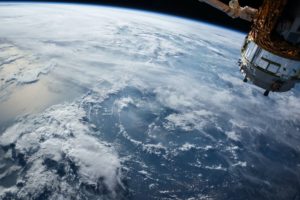Journeys to Humanism: Launching into the Scientific Worldview
Journeys to Humanism, theHumanist.com’s regular series, features real stories from humanists in our community. From heartwarming narratives of growth, to more difficult journeys, our readers open up about their experiences coming to humanism.
John Boncek
Maryland Heights, MO
My journey to humanism was the outcome of my struggle between the worldview of religion and the worldview of science.
I was raised in the Roman Catholic religion in the 1960s-70s, a time when science was becoming increasingly influential. My parents and both sides of my extended family were Catholic. We attended church every Sunday and I was sent to the local Catholic parish school for grades one to three. I went through First Communion and Confirmation, and even was a server (then called an altar boy) for a year or two.
My first exposure to anything scientific that I recall was when my parents brought home a large illustrated book of dinosaurs. I don’t remember if I could read at that point but I was immediately taken with the great beasts. Sometime later Dad took my sister Marianne and me to see life-sized dinosaur figures at a traveling exhibition put on by one of the petroleum companies–around six or eight life-size model dinosaurs mounted on trailers in a local shopping center’s parking lot. The most impressive of the dinosaurs was the Tyrannosaurus Rex.
Another subject that fired my interest from a very young age was spaceflight. I well remember being glued to the TV during long, tense countdowns for the Gemini and Apollo mission launches, some narrated by the venerable Walter Cronkite. (Watching a launch still gives me a thrill.) Live broadcasts from the spacecraft and later from the moon were absolutely spellbinding. The one thing I’ve never forgiven my parents for was not letting me stay up to see the first moonwalk, which was scheduled for around 11pm on a July night (not even a school night, in other words). That was in 1969, when I was eleven years old. (I have since seen video.)
So as I grew up I gradually became more immersed in the scientific worldview and the critical thinking it requires. By the time I entered high school, some questions had been bothering me for a long time. One in particular that I recall was this–why were there so many religions? Or, if ours was the right one, why didn’t other people see that? I always turned my thoughts away from serious consideration of these issues because I knew it to be sinful to even think about such things.
In my freshman year of high school I had a conversion experience prompted by the conflict in these worldviews. In my memory, it happened over just one or two nights lying in bed thinking it through. I’m no longer sure of that, but I realized that God would want me to think things through and know the truth. Almost immediately (it seems in memory) I felt like blinders had fallen away. I saw that from a scientific standpoint there was no good evidence for religion of any kind and that science provided evidence of our world, indeed our universe, being vastly older and more complex than it was painted by the religious stories, which seemed like fairy tales in comparison. In brief, I realized that our religion was as mythological as all the others. I no longer believed in anything supernatural and came to think of myself as an atheist. However, I wasn’t brave enough to tell my parents so until my first year of college four years later, by which time I was surrounded by people who were atheist, agnostic, or at least didn’t take religion very seriously.
During a weekend visit home, Mom started questioning me rather insistently about keeping up my religion while away at school. I was trying to dodge the questions but then she put it point blank by saying, “John, don’t you believe in your religion anymore?” I hesitated for a moment but then said I did not. I don’t recall much of any reaction from her or Dad. Perhaps she didn’t tell Dad until I had gone back to school, but Marianne told me that they both took it very hard. Dad, who was pretty devout, probably prayed for me every night for the rest of his life.
I hadn’t heard of humanism at the time of my conversion, but I eventually read Corliss Lamont’s Philosophy of Humanism and found myself in agreement on almost every point. I had become a humanist without knowing the term. Many years later, the love of my life, Vicky, and I joined our lives together in a humanist wedding. (Vicky wrote most of our ceremony.) I still love Christmas as a family tradition but without any supernatural beliefs.
We all have our own stories of how we came to be humanists, and we want to hear yours! Fill out the form here to be featured in this series.

